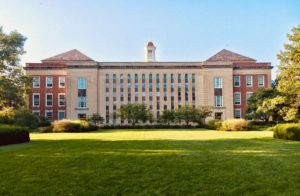Taking a college tour is an excellent way to see if a college is a good fit for you. The standard tours are helpful for getting an idea of the campus’s hot spots. But if you’re savvy, you can get more out of your tour by following these tips:
1. Schedule your visit during the school year.
If possible, schedule your tour during the regular academic year, at a time when school is in session. Campuses have a very different vibe when the students are present. You want to get a feel for what the school will be like if you attend it, and it’s hard to know what it’s like if you visit during the summer when the campus may be used for other purposes like youth soccer camps. You can look at a school’s website for their academic calendar to ensure that you do not visit on a school holiday. Do not assume that college will be in session at the same time as high school – colleges have different breaks (e.g. often a four-day “Fall Break” in October) and don’t always follow public holiday schedules. You can also call the campus to see the best times they suggest visiting.

Get the most out of your college tour by visiting while students are on campus.
2. Meet with a professor.
If you have a potential major or several major options identified, see if you can meet with one or more of the professors teaching in those departments. You can get a lot of information from the department’s website. Usually, this will include professors’ office locations and office hours. If there is a professor you would really like to speak with, line up your campus tour to make it convenient for you to attend their office hours. If you’re having trouble locating the information you need, call the departmental or campus visit phone number (usually under the “Contact Us” tab on the department’s website). Typically a departmental administrative assistant will be able to connect you with the information you need. If you meet with a professor, remember that their time is valuable. Go to your meeting with questions prepared. Here are some suggestions:
- Are there opportunities for undergraduates to get involved with research?
- Are there funding opportunities for undergraduates to do their own research or attend professional conferences?
- Is there a student organization or club associated with the department (e.g. a Psychology Club or an honor society like Psi Chi?)
- Are there any regular departmental gatherings or events that undergraduates can get involved in (e.g. some departments have yearly research competitions, others have casual events like weekly happy hour or monthly pizza parties)?
- If the institution has graduate students, how common is it for graduate students to teach courses?
- Are there any scholarships specifically designated for students pursuing studies in this field?
- What types of jobs are graduates of this department getting? Does the department compile statistics on job placement rates?
There may be other things that are important to you. If you’re worried about whether your questions are appropriate to ask a college professor, run them by your high school guidance counselor first. If you are unsure about your major, you could meet with a professor in a field that you are considering, or if you are deciding between a couple of majors, you could set up meetings in both departments. Maybe you really don’t know what you want to focus on in college – if so, don’t sweat it – meeting with a professor is totally optional and is more informative for those with an idea of the field they want to enter. If that’s not you, skip this step or talk with a faculty member who teaches a general education class you’ll likely have to take at that college. If you do sit down to chat with a professor, take the time to send them a thank you email afterward (professional pro tip: make sure your email address and display name are appropriate – you shouldn’t be sending work or school-related emails from an immature or inappropriate email address).
3. Ask questions.
Have questions prepared for your tour guide. Tour guides are typically well-involved students, so they are often knowledgeable about what’s going on around campus. Some suggestions for questions to ask your tour guide:
- What is the event that students get most excited about?
- Do most students live on campus? Are there restrictions for first-years regarding where they can live?
- What makes this campus or community unique?
- What’s the best piece of advice a faculty member has given you? (This is a good question because it gives you some insight into whether students have good access to faculty members – if your tour guide isn’t able to come up with any response, or if they say they don’t really have individual conversations with their professors, this could be a red flag).
- Do most students stay on campus over the weekend, or do most students leave?
- Is it safe to walk around campus at night? What about the areas surrounding campus?
- What’s the favorite off-campus hangout for students?
- If you have an hour between classes, where are you most likely to hang out?
- How ethnically diverse is campus?
- Is Greek life (i.e. fraternities and sororities) a big part of campus life?
These are just some examples – this article has 118 suggested questions to ask on a campus tour. The important thing is to focus on questions that matter to you – if you’ve always dreamt of joining a sorority, it’s a good idea to make sure Greek Life is an active part of campus culture. If you identify as a minority and you want to make sure there will be a strong community of others like you, ask those questions.
If your parents are attending campus tours with you, it can be tempting to let them take the lead and ask all the questions. While they may have some great questions, remember that this is about YOUR college experience. Don’t be shy! Be bold and ask questions yourself. This gives you a chance to focus on the things you really care about and allows you to make the experience your own – after all, the college experience will be all yours. Start off by owning it on the college tour!
4. Explore more of the campus.
Give yourself extra time after the tour to explore the campus. For obvious reasons, campus tours tend to focus on the best features of the campus – the recently renovated dorm, the best dining hall, the photogenic quad, or the academic building with state-of-the-art laboratories. Wander around campus and check things out for yourself. Think about the places you would be likely to spend your time – dining halls, the library, the larger dorms or those that house first-year students – and make sure to stop by those places. You can also personally explore campus before your tour so that way on the tour you can ask your tour guide for more information about places that aren’t typically highlighted.

Exploring the campus on your own can help you get an authentic feel for student life on campus.
5. Talk with an admissions counselor.
Swing by the campus’s admissions office to chat with an admissions counselor. The people working in admissions offices are excellent resources – they are experts on college admissions, so they have loads of information about scholarships, getting into college, and the campuses where they work. They will be happy to answer any questions that you didn’t get a chance to ask your tour guide, or that your guide was uncertain about. Some schools offer the opportunity for formal admissions interviews. If this is a possibility and you are serious about the school, you should take advantage of the opportunity. An admissions interview will make you more memorable. If you do schedule an interview, be prepared with questions, dress professionally (business casual is typically sufficient), and practice answering questions without fillers like “ummm” and “like.”
6. Learn about extracurricular activities.
Do you have a hobby that you intend to pursue in college? See if the campus has the resources to support you in pursuit of all your interests. For example, if you love to play basketball but you aren’t going to be on the college team, see if there are opportunities for intramural sports. You can ask your tour guide or an admissions counselor about this. The college might also have a list of clubs and organizations for you to get involved with on their website. Interested in an opportunity listed? Ask for more information about that organization or to meet with the faculty advisor or student leader.
7. Explore places off-campus.
As the name implies, campus tours are generally restricted to the campus itself. However, as a college student, you will probably spend a lot of time in the area around campus as well. Ask your tour guide (or any other students you come into contact with) where they like to hang out off-campus. Then check out their suggestion and the area surrounding campus – does it have good restaurants and places to hang out? Do you feel comfortable there or could you see yourself hanging out in some of those spots as a student? If the surrounding area gives off a bad vibe, that’s something important to consider as well.
8. Stay on campus.
If you have the opportunity to schedule an overnight visit at a place you are seriously considering, give it a try. Staying on campus overnight can be very informative since you’ll spend some time hanging out with actual students and getting more familiar with the campus. However, if your overnight visit doesn’t go well, think about why – did you dislike the campus, or were you mismatched with your host? If your host had dramatically different interests than you, it could have negatively impacted your experience. Keep perspective about your overnight experience as you make your decision about the college.
9. Take notes.
If you’re scheduling multiple campus tours, the tours will quickly start to blur together in your mind. To remind yourself of relevant features of each campus and things you liked and disliked, jot down some notes immediately after your visit that will jog your memory later on. If you know some of the qualities you want in your college experience, make a list of the specific features. As you visit each college make note of which schools have what you’re looking for. Consider this the start of a pros and cons list, which will help you make your decision later on.

Touring a second time can help you know with more certainty if the college is a great choice for you.
10. Take a second tour.
Did you have mixed feelings about the campus and you can’t quite figure out why? Sometimes extraneous factors can have an impact on your opinion – maybe you visited campus on a gloomy day, sat in on a class when a professor was lecturing on a boring or difficult topic, had an inexperienced tour guide or an overnight host you didn’t connect with, or just visited on a day when you were in a bad mood. If you can’t quite figure out what was off and you’re trying to decide whether to attend the school, consider scheduling an additional campus visit. Another try might help you sort out those feelings.
In addition to making the most of your tour while you’re on it, make sure you go on several tours for comparison purposes. Because campus tours tend to focus on the best parts of campus, it’s natural to be wowed by a tour. Schedule a few tours at different campuses to get a better view of the big picture. It’s also helpful to tour several different types of colleges (large state schools, small private universities, etc.) to get a better idea of what will be accessible to you at the different types of schools.
If you have chosen a “safety school,” tour that too. Touring your safety school will help you get familiar with it and excited about the resources it has to offer. Then, if you end up at your safety school, at least you’ll have some specific things to be enthusiastic about when you consider attending your backup school.
Above all, remember to enjoy yourself. Campus tours are a great way to get excited about attending college and entering this new phase of your life!




